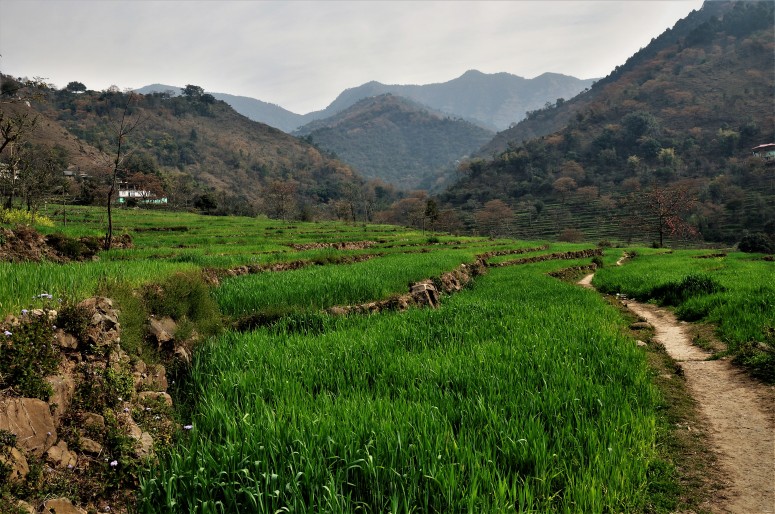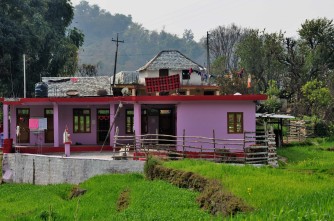By Kalpana Jamwal
I arrived to Delhi in the summer of 1999 to live with my parents and two younger siblings. Up until then, I had been living in a village in Himachal with my paternal grandmother whom I lovingly call ‘Ammaji’. Although my parents and two younger siblings had moved to Delhi, it was decided that I would stay back in the village to keep my grandmother company. The plan was to bring me to Delhi for the final years of high school since the educational facilities in Himachal in those days were not as good as they are now. However, my mother soon prevailed over the plan and I moved some years before that.
It has been almost 18 years since I moved to Delhi but I still insist on maintaining that I am, first and foremost, a Himachali. This strong sense of ‘Being Himachali’ was deeply nurtured by our parents. At home, we continued to speak in our local dialect Mandyali (or Pahadi as it is popularly known), while many around us made efforts to ‘fit into’ the Delhi culture by adopting the local languages along with dropping the vernacular. I think these families were concerned that speaking a local dialect would make them appear ‘backward’ and they wanted to be seen as progressive. Their city-educated children should sound different, they must have assumed.

Regarding links with the village, my parents would ensure that we spent our summer holidays with Ammaji in our village and keep close contact with all our relatives in the area. I still remember how we used to cry our hearts out every time we had to leave the village after vacations. It was painful to see our Ammaji crying too. It was a sad sight for some and a cause of great amusement for others! Once communication links got better, we would keep in regular contact through telephone calls which continues till date. Apart from the summer months, we eagerly looked forward to disruptions in our school schedule on account of marriages or festivals at home, and the whole happiness-followed-by-tears cycle would repeat itself. When I look back now, I realise that my parents understood our city life as a necessary burden they had to bear on account of progress. Their work and our education was important enough for them to live in another place, not that we didn’t like living in Delhi either. But our hearts were firmly located in the village and my parents would say that they are in Delhi only because of the children’s education.
When my parents first moved, it was quite a progressive step forward for the family to break away from the traditional, safe and familiar context of village life where everyone knew everyone else. For a daughter-in-law (my mother) to be expected and allowed to live by ‘herself’ (nuclear family amounted to living alone) was unheard of. Special arrangements had to be made for the village land and cattle to be tended to, and organizing that was not easy. The pain of moving was justified simply on the basis of a good education for the children. When we visited the village, elderly women would say to me “Shabaash mera bacha! Khoob padho, nahi toh hamari tarah gobar uthana padega” (Great job, my child. Study hard, otherwise you will be handling cow-dung like us). I still need to understand fully what they meant. From my perspective they had wonderful lives because they didn’t have to leave the village and didn’t have to depend on others, or perhaps something more profound, but I guess basically, education was very highly valued in our community. Perhaps that is why school education in Himachal has recently developed very rapidly and even villages have excellent schools available for children. The adoption of the National Curriculum Framework by the State Education Department has been exemplary. When we were growing up, this was not the case. The words I heard from these women left a lasting impression on me, and I was determined to work hard and make something of my life (I am now enrolled for a Ph. D.). Our ties and intimacy with village life were maintained on account of our regular visits, and unlike some others who move, we hadn’t forgotten our family.

My memories of childhood spent in Himachal always bring a smile to my face. The scenes were idyllic. Set in the lower hills of the Himalayas from where the snow-capped mountains of the Dhauladhar range were clearly visible, we had the freedom to wander around freely in and around the village. The local streams with clean fresh water making its way from freshly melted snow in its journey between the rocks and pebbles was a place we would soak our feet. This is a particularly vivid memory. With every passing year, my love for the village life increases. I see myself as privileged, not only because I have benefited from these two lives, but that I have this small piece of heaven where I can go any time, and where I know also that I am loved. I have had the benefit of a city life and I am closely attached to the rural world. Particularly valuable aspects of the village life include the closeness that people share in Himachal where older members of the community are held in high regard and loved. I also want to mention the food. I love Himachali cuisine and the taste of the freshly plucked fruits is beyond words. I love the fact that all the children in the family participate in household chores irrespective of their age or sex. Boys and girls of all ages contribute to household work on a regular basis, whether they have examinations the next day or not. Responsibilities are divided among all members. I remember my grandfather and father would cook regularly and my brother has also learned and is a great cook, as am I, I think. In this regard we were unusual among our peers in the city because of the fact that attending school was meant to replace participation in the household, especially for boys. No such practices were followed in the village and we realised we were different and gradually learnt to pride ourselves in that. When I look back at our pride in being that way, I remember that it was an appreciation of our difference, and became a strong aspect of my identity.

Village life ensures that one is always active and engaged, responsible and happy. Goodies from the farm and cattle like desi ghee, arbi pattas (taro leaves), khattas (grapefruit), haldi, other masalas, dals, different flours like rice, corn and bajra were considered highly valuable in my household. My mother would request visitors for fresh food from the village. As a school kid, I felt different from the others around me because I was eating rotis soaked in desi ghee which was made by my own Ammaji from the milk of her buffalo. This connection with her was special. This may sound frivolous now in the age of plenty, but it is still a very valuable thing for me. Food was considered so precious that nothing was every wasted, we served ourselves only with how much we could eat, nothing was thrown away. Any left overs that remained were offered to the birds and animals around.
Another aspect of village life was the reassurance of the constant feedback one would receive from others. We often heard comments like “people from Himachal are good people” (Himachali log toh bahut ache hote hai). This always reinforced a sense of goodness in me, but it never made me arrogant, I feel. It made me happy and proud (in a mild, agreeable way) of being Himachali. I never felt superior to others, just different. More recently, when I decided to marry a non-Himachali, it was a big issue for my family, and also for me. My Mamaji tried to convince me about the folly of marrying an “outsider” when I could easily get a “good husband” from within the community (Beta hamare logo jaise achhe log kahi nahi milenge, hum swarg jaisi jagah me rahte hai). I would like to add that I did marry the person whom I chose and am very happy with him. I did not see that as a threat to my identity as a Himachali. That is a part of me that will stay with me through my life.
Commentary, to be continued in the following week………………….

It is a good fortune to be born on this beautiful land of earth..we called it “Himachal”..its a proud feeling to say that “I am from Himachal”I wish your parents is agree to marry a person from outside.wish you all the best 🤞👍
LikeLike
Well written di 🙂
LikeLike